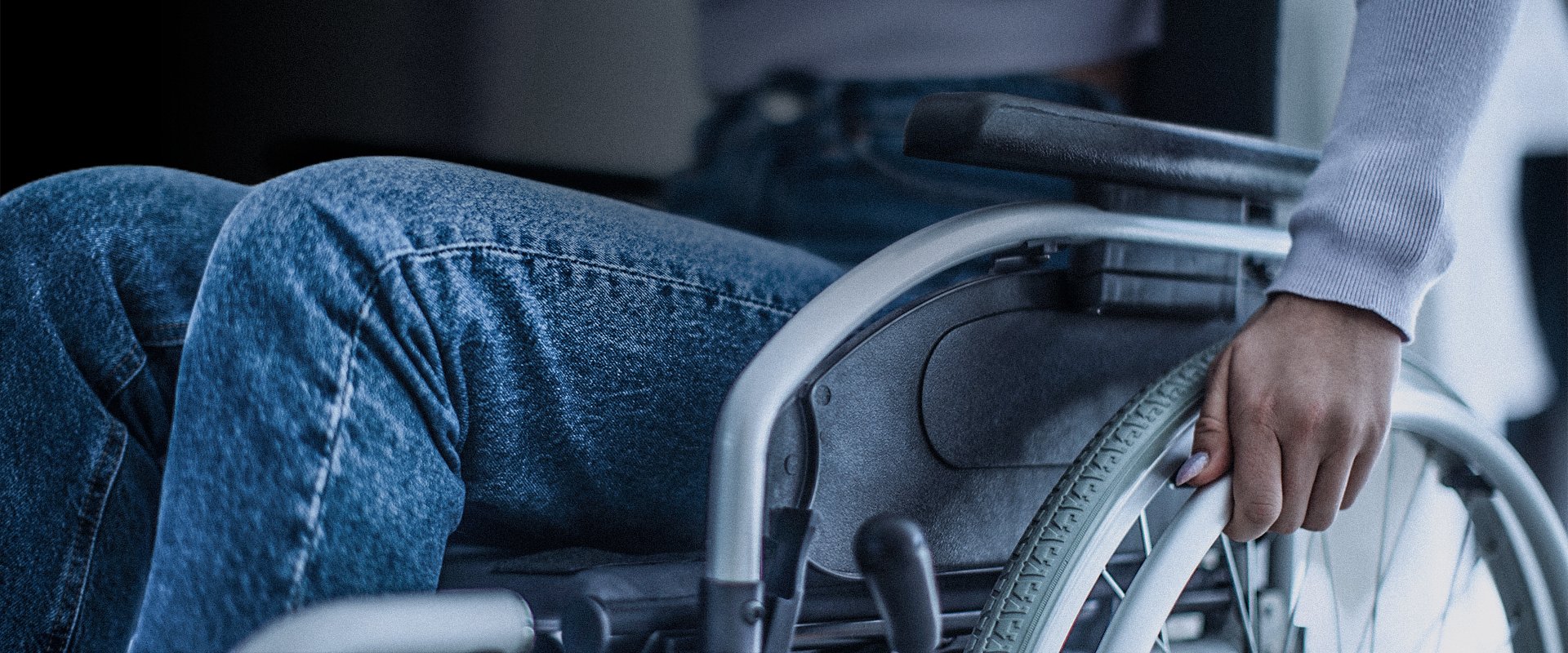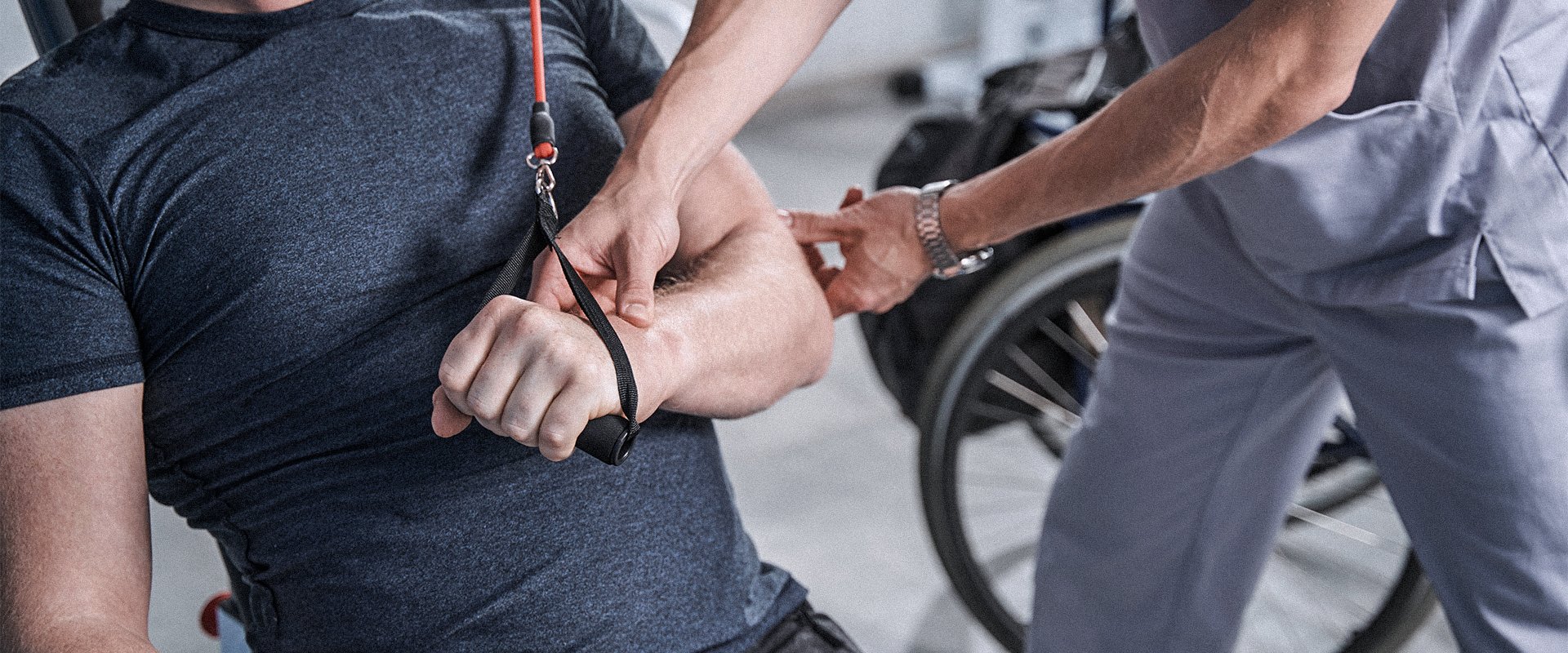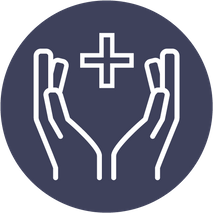
Physical Therapy for ALS
AT EVOLVE
Physical Therapy for ALS
HOW CAN PHYSICAL THERAPY HELP TREAT ALS?
Amyotrophic Lateral Sclerosis (ALS) is a progressive neurodegenerative condition that affects the nerve cells in the brain and spinal cord. The role of physical therapists in the management of ALS changes based on the stage of the disease but having a knowledgeable physical therapist on your care team can provide many benefits including managing pain and discomfort, providing strategies for optimal positioning and assistance from caregivers, maximizing independence in function at each stage and assisting with the acquisition of equipment.
WHAT DOES PHYSICAL THERAPY FOR ALS LOOK LIKE?
As mentioned above, the role of a physical therapist in the management of ALS changes based on the stage of progression the patient is experiencing. We will start with an initial evaluation in order to understand the pattern of symptoms you are experiencing as well as your goals and needs. We can then develop an individualized treatment plan based on your needs and the best evidenced-based techniques for the management of ALS. In the earlier stages you may be working one on one with a therapist performing exercises to maximize strength, flexibility and independent function. In the later stages your therapist may be working with your family member, caregiver or care partner to help them keep you safe, comfortable and healthy.
WHAT IS ALS?
ALS is a progressive neurodegenerative condition that affects the motor nerve cells in the brain and spinal cord. This condition causes progressive degeneration of the motor nerve fibers eventually resulting in the death of the nerves. As the nerve fibers begin to degenerate, individuals with ALS will notice weakening or atrophy of their muscles as nerve signals struggle to transmit effectively between the brain/spinal cord and the muscles they innervate. In 90-95% of cases, the cause of ALS is unknown meaning there is no genetic or inherited cause for the disease. In the other 5-10% of cases the condition is inherited from a family member. This is often referred to as familial ALS and individuals with this type of ALS have a 50% chance of passing on the gene mutation to their offspring.
Early symptoms of ALS include muscle twitches (fasciculations) in the hand, arm, leg, shoulder or tongue, muscle cramping, muscle spasticity, muscle atrophy, weakness in the muscles used for chewing and swallowing, and difficulty articulating words. As the disease progresses muscle weakness and atrophy will spread to all voluntary muscles throughout the body. Eventually individuals with ALS will be unable to walk, stand or move their limbs. Weakness in the muscles of the throat and mouth cause dysarthria or difficulty speaking, dysphagia or difficulty swallowing and eventually breathing difficulties will develop as the muscles of the diaphragm and abdominals weaken. Full paralysis of all voluntary muscles sets in at the end stage of the disease wherein interventions like a feeding tube to provide nutrition and intubation to provide oxygen will be necessary to sustain life.
ALS can develop at any age but most commonly develops between the fifth and seventh decades of life. A small number of people will live with ALS for a decade or more but most individuals will die from respiratory failure within 3-5 years after symptom onset. This condition cannot be diagnosed by a single test. A neurologist may suspect ALS based on symptom presentation and utilize a series of tests such as EMGs and nerve conduction velocity studies, muscle biopsies, blood and urine tests and MRIs to examine the function of the nerves, evaluate the health of the brain and spinal cord and look for other causes of your symptoms.
A team of professionals such as a neurologist, pharmacologist, physical therapist, speech therapist, occupational therapist, respiratory therapist and nutritionist will help care for individuals with ALS. Drug treatment is limited but there are a couple of drug options that may help prolong the life expectancy or slow declines in function in those diagnosed with ALS but much of the treatment available is supportive and aimed at minimizing symptoms and maximizing comfort.
End Injury Progression
Physical therapy for ALS has proven to prevent injury, slow and even stop pain issues, improve performance, and slow progression in many cases.
Relieve Pain
The movements used in this technique can target your entire body helping you to manage discomfort and pain during the course of your physical therapy treatments.
Improve Range of Motion
Posture awareness is an important area to focus on due to the fact that certain positions may cause you further discomfort and pain.
Restore Mobility
You can regain mobility and flexibility by taking part in the stretches and exercises as prescribed by your physical therapist.
How Long Will Physical Therapy for ALS Last?
If you decide to work with a physical therapist to help with ALS and related issues, your entire treatment plan could consist of around 8-20+ different physical therapy sessions that will each last 60-90 minutes. Once you complete your customized physical therapy treatment plan, you will be able to continue to do the prescribed stretches and exercises utilized during your PT sessions yet in the comfort of your own home.
PHYSICAL THERAPY INTERVENTIONS FOR ALS
Physical therapists play a supportive role in the management of ALS. As mentioned above, the role of a physical therapist changes based on the individual needs of the patient as well as their disease stage. Some of the important ways that physical therapists can help their patients with ALS are as follows:
- Assist with the acquisition of equipment and orthotics to help with optimal positioning, pain reduction, comfort, transfers, ADLs and mobility that take into account the quick progression of ALS symptoms
- Provide an appropriate intensity strength, aerobic and stretching program during the early stages of the disease to help maximize muscle function and aerobic and respiratory capacity
- Assist in the management of pain and discomfort through manual therapy techniques
- Educate patients and family members on what to expect and how to prepare for increasing caregiving needs as time goes on
- Provide caregiver and care partner training on how to transfer, position and reposition their family member
Mill Basin (located in Harbor Fitness)
6161 Strickland Ave
Brooklyn, NY 11234
Monday: 7am-8pm
Tuesday: 7am-8pm
Wednesday: 8am-5pm
Thursday: 7am-8pm
Friday: 8am-1pm
Park Slope (located in Harbor Fitness)
550 5th Ave.
Brooklyn, NY 11215
Monday: 9am-8pm
Tuesday: 8am-6pm
Wednesday: 9am-8pm
Thursday: 8am-6pm
Friday: 8am-3pm
Gravesend
372 Avenue U
Brooklyn, NY 11223
Monday-Thursday: 8am-8pm
Friday: 8am-3pm
Midwood
945 Kings Highway
Brooklyn, NY 11223
Monday-Thursday: 12pm-8pm
Ready to take the next step to a healthier you?
Contact Us Today!
PHYSICAL THERAPY FOR ALS!
Need physical therapy for Amyotrophic lateral sclerosis?
Let our caring and compassionate physical therapists help you with relieving pain while getting you back on your feet comfortably.
Call now to schedule your first PT consultation free of charge.
Call: 1-718-258-3300







